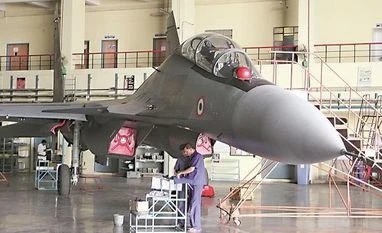Hindustan Aeronautics (HAL), on Friday, joined the elite group of companies having market capitalisation (market cap) of Rs 2 trillion with the stock of the state-owned defence firm more-than-doubling in the past 10 months.
Shares of HAL hit a new high of Rs 3,038.60, surging 5 per cent on the BSE in toda's intraday trade, on strong business outlook. In the past 10 months, the stock has zoomed 123 per cent. Moreover, it has skyrocketed 1,257 per cent from its March 2020 lows from level of Rs 224 (adjusted to 1:1 stock split).
HAL's market cap hit Rs 2.03 trillion in the intraday trade today. At 09:51 AM, the company's market cap stood at Rs 2.01 trillion. Currently, HAL is the seventh public sector undertaking (PSU) company having a market cap of over Rs 2 trillion.
HAL is engaged in the design, development, manufacture, repair, overhaul, upgrades, and servicing of a wide range of products including, aircraft, helicopters, aero-engines, avionics, accessories and aerospace structures.
Brokerage firm UBS has initiated coverage on the stock with a 'buy' rating and a 12-month target price of Rs 3,600 per share.
"After three years of flattish growth, HAL is set to triple its order book from Rs 0.8 trillion in FY23 to Rs 2.4 trillion in FY26E. HAL is on course to re-rate by a similar magnitude to BHE in the past decade, if it gets its execution right," the brokerage said in its report.
HAL has a $10 billion-plus order book, and we think it could benefit from $60 billion of more defence aircraft orders from now till FY28E, of which $16 billion have already been approved and $40 billion-plus with higher local content, should be awarded in the next 5-7 years, it added.
"We expect the depletion of India's military aircraft strength in the coming few years, geopolitics, and a need for greater aircraft availability to accelerate ordering and lead to a manufacturing ramp-up at HAL vs the past decade (our FY23-26E orders/revenue forecasts are 15 per cent/7 per cent above consensus). All told, HAL's military aircraft monopoly and faster capability build-up, combined with a significant policy push and robust domestic supply chain, lead us to initiate with a Buy," UBS said.
Meanwhile, on November 30, HAL said the Defence Acquisition Council (DAC) has accorded approval in respect of Acceptance of Necessity (AoNs) for various Capital Acquisition Proposals amounting to Rs 2.23 trillion, of which, acquisition worth Rs 2.20 trillion (98 per cent of total AoN amount) will be sourced from domestic industries. This will give a substantial boost to the Indian Defence Industry towards the aim of achieving the goal of 'Aatmanirbharta', the company said in an exchange filing.
To make the defence sector commercially viable for private players, India offers a strong domestic market, export opportunities, and government procurement assurances.
"Emphasizing domestic manufacturing, 75 per cent of the capital procurement budget is allocated to local sourcing with the Positive Indigenisation list (PIL) boosting visibility and appeal. This message has also reached foreign OEMs, signalling that imports for certain items will be restricted after a specified period. This incentivizes them to establish manufacturing facilities in India, where they can access a conducive domestic market and explore export opportunities," according to analysts at Incred Research Services.
Meanwhile, analysts at Prabhudas Lilladher beliebve HAL is a play on the growing strength and modernisation of India's air defence given its position as the primary supplier of India's military aircraft, long term sustainable demand opportunity, owing to the government's push on procurement of indigenous defence aircraft, leap in HAL's technological capabilities due to development of more advanced platforms (Tejas, AMCA, etc.), robust order book of over Rs 80,000 crore with further 5-year pipeline of Rs 2 trillion, and improvement in profitability through scale and operating leverage.
Under the Atmanirbhar Bharat initiative, the Government is facilitating the development of the Indian industry to reduce the defence import as well as dependence on the foreign OEMs. Various initiatives of the Government of India (GoI), in recent days, have given thrust on the indigenisation and indigenous procurement of defence equipment. Over next 5-10 years such reforms will equally help Defence PSUs and private industry to put a firm step towards achieving a self-sustaining Defence industry in the country.
"In the near future, the Indian Defence market will continue to be a prime revenue source for HAL due to projects like LCA Mk1A, LCH, LUH and HTT-40. The company has taken various initiatives to make systems more agile, effective, cost efficient and to be competitive. Enhancement of HAL capability is being planned to cater above projects. New production lines are being installed for HTT-40 and LCA Mk1A Production," the company had said in its FY23 Annual Report.
Unlock 30+ premium stories daily hand-picked by our editors, across devices on browser and app.
Pick your 5 favourite companies, get a daily email with all news updates on them.
Full access to our intuitive epaper - clip, save, share articles from any device; newspaper archives from 2006.
Preferential invites to Business Standard events.
Curated newsletters on markets, personal finance, policy & politics, start-ups, technology, and more.
)